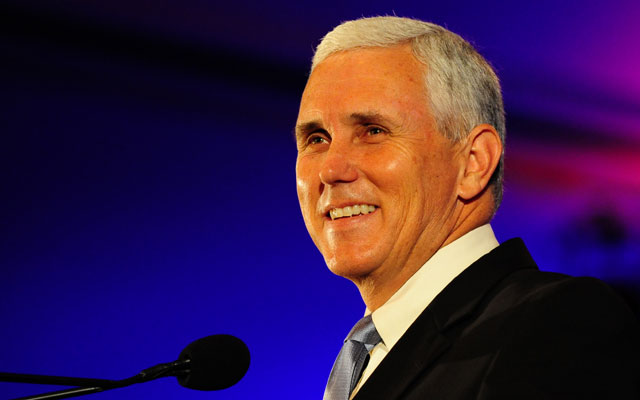Are Governor Pence’s 2016 Dreams Over?
A flurry of controversy surrounding Indiana’s Governor, Mike Pence and the Religious Freedom Restoration Act he signed into law on March 26, 2015, has caused many people to wonder if Pence’s 2016 dreams have been dashed.
Rewind to January 2015, Governor Mike Pence from Indiana was among the many names being floated as potential presidential hopeful. As any strategist will tell you, presidential hopefuls need three things, an expansive fundraising network, an ability to turn out voters, and name recognition to be taken seriously in a crowded primary field. Unlike Former Florida Governor Jeb Bush, and Senator Marco Rubio, Governor Pence lagged in the name id department.
Previously serving as chairman of the House Republican Conference, Pence resigned in November 2010 to run for Governor of Indiana. Many cited this move as Pence laying the groundwork for a presidential run in 2016, since American voters prefer governors over candidates who lack chief executive experience.
In November 2012, Pence won the governor’s race in Indiana and became the Hoosier state’s 50th governor. The stage was set, Governor Pence would spend the next few years gaining executive experience and working hard for the people of Indiana. During his state of the state speech on January 13, 2015, Governor Pence outlined a list of achievements:
“Unemployment has fallen faster here than almost anywhere in America. When I was elected Governor, unemployment was over 8 percent. Today it’s 5.7 and falling. We added more than 100,000 private sector jobs in the past two years, and we are on track to have more Hoosiers working than ever before.”
While jobs, two balanced budgets, and a tumbling unemployment rate set the tone for the kind of leader Governor Pence was in the Hoosier state, it was clear he was just getting started and people were almost sure he was preparing for the national stage.
From trips to Germany to headlining both the Wisconsin and Alabama Republican Party’s annual convention rumors began to swirl and conflicting reports of Pence testing the waters for a presidential bid took off. In a Huffington Post article last April, Darrell West, vice president and director of Governance Studies at the Brooking Institution, a Washington-based think tank, said, “He’s testing the waters. He would be on a long short-list. He’s not at the very top of the list, but the top of the list doesn’t look so strong at this point.” On the other hand, Larry Sabato, director of the University of Virginia Center for Politics pointed out, “when candidates want to make it clear that they’re thinking about running, they make it clear.”
When asked about his 2016 dreams, Pence denied his presidential ambitions and stood by his commitment to the people of Indiana, “any time I’m mentioned or talked to about the highest office in the land is deeply humbling, deeply humbling to me and my family, but my focus is Indiana.”
Rightfully so, because just a few months after giving a strong state of the state speech, Pence found himself at the epicenter of controversy. After signing the Religious Freedom Restoration Act (aka: RFRA) on March 26, 2015, Governor Pence was hit with a barrage of backlash and his name quickly flooded the living rooms of Americans everywhere.
The waves felt in the landlocked state of Indiana were tsunami-like, and critics from across the country weighed in, while some states such as, New York, Connecticut, and California went as far as to ban all nonessential government-funded travel to the Hoosier state.
As controversy enveloped the Governor, strategists argued that Pence has sealed his fate and closed the door to a 2016 run. Caught in a surprise culture war, according to Adam Wren, a contributing editor at Indianapolis Monthly, and his 2016 dreams are crumbling.
While the circumstances have been less than stellar, Pence unintentionally landed himself in the national spotlight and has shaped the conversation on social issues in the upcoming presidential election. For better or worse, Pence has elevated his name id across the nation in a matter of days.
This is not the first time we’ve seen a firestorm catapult a 2016 hopeful into the spotlight over a misstep on a bill. Senator Marco Rubio took a hardline stance in September 2013 and supported a bipartisan immigration bill that sent much of the Tea Party into a frenzy. Yet, here we are days away from his presidential bid announcement in Miami.
The argument can go either way on whether Pence can polish his newly tarnished name and reputation in time for 2016. However, one thing is for certain, Governor Mike Pence is one name you won’t forget for awhile.

